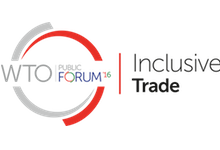E-commerce as a tool for inclusiveness in developing countries: Dissecting the Argentine case
27 Sep 2016 16:00h - 17:30h
Event report
[Read more session reports and live updates from the 2016 WTO Public Forum.]
This session, organised by the Mission of Argentina to the WTO, discussed the importance of digital innovation for trade in developing countries, with a focus on the e-commerce experience of Argentina. Moderator Gustavo H. Méndez, Counsellor at the Permanent Mission of Argentina, explained the reasons behind the session. He considers e-commerce to be an important tool for developing and developed countries. It can place large companies, small and medium enterprises (SMEs), and micro businesses on an equal footing, and break through the paradigm of benefiting one group of countries rather than another. In short: ‘It is a special tool favouring inclusiveness in developing and developed countries.’
Subsequently, Carlos Pallotti, Undersecretary for Services and Technology in the Argentinian Ministry of Production, explained the current state of e-commerce in Argentina, and the government’s plans to transition to a knowledge-based economy. The growing prominence of e-commerce in Argentina has been particularly aided by:
- Increased Internet access.
- Early regulations (e.g. the 2001 e-signature law).
- The growth of big Argentinian e-commerce ‘unicorns’.
- The drafting of new laws to promote SMEs.
- Extensive programmes to train programmers and system engineers.
Adding to Pallotti’s presentation, Maria Florencia Forciniti, Secretary of Investment Promotion at the Ministry of Communications, provided a detailed overview of how e-commerce is promoted in Argentina. She emphasised the collaboration and coordination of activities with stakeholders from all sectors, and linked e-commerce to the sustainable development goals. She concluded by saying that although e-commerce has the potential to improve the quality of life and bring modernisation, we should continue to look into regulatory aspects, such as the area of security, and to create trust among all stakeholders.
Gustavo Sambucetti, Director of the Argentinian Chamber of e-Commerce, provided a private sector perspective. He highlighted the background and activities of the Chamber, and pointed to the immense growth of the Argentinean e-commerce market over the last few years. According to him, this has been particularly driven by the supply of quality services.
Moving to a more global perspective, Quan Zhao, Trade Policy Advisor at the International Trade Centre, embedded the discussion into a broader framework. He explained the ‘Box and Ladder’ theory: e-commerce moves traditional business out of its box (confined by geography, limited demand, etc.) into a limitless space. Yet, in this space, it becomes difficult to distinguish itself in the growing crowd of e-commerce businesses, leading to the need for a ‘ladder’ – in the form of digital tools – to become visible. Those who fully benefit from e-commerce opportunities, and will be able to distinguish themselves are:
- First movers: early adopters of technology.
- Tall guys: they don’t need a ladder, as they already have a unique product.
- Ladder users: they use the Internet and new business models to sell their products (optimally using social media, traffic drivers, search engines, etc.).
- Ladder builders: usually big Internet companies (e.g. social media, search engines, etc.).
With the next billion Internet users mainly located in developing countries, there is great potential for developing countries to build their own ladders, platforms, and Internet companies. Yet, Zhao emphasised that this does not mean that there should be protectionism around national companies. This will not work, as companies are becoming nationless and technologies are evolving rapidly.
Finally, Andrew Crosby, Managing Director at the International Centre for Trade and Sustainable Development (ICTSD), addressed the need for an enabling environment in which e-commerce can prosper. He raised the question of whether Argentina is taking full advantage of digital opportunities by optimising its regulatory environment. Furthermore, he posited three recommendations for the global improvement of regulations:
- Update the WTO rules in digital trade.
- Expand and deepen regulatory cooperation.
- Promote public-private partnerships to support digital trade at the national level.
After the session, participants were invited to enjoy a cup of coffee with some incredible Argentinian cookies (alfajores).
by Barbara Rosen Jacobson
Related topics
Related event

